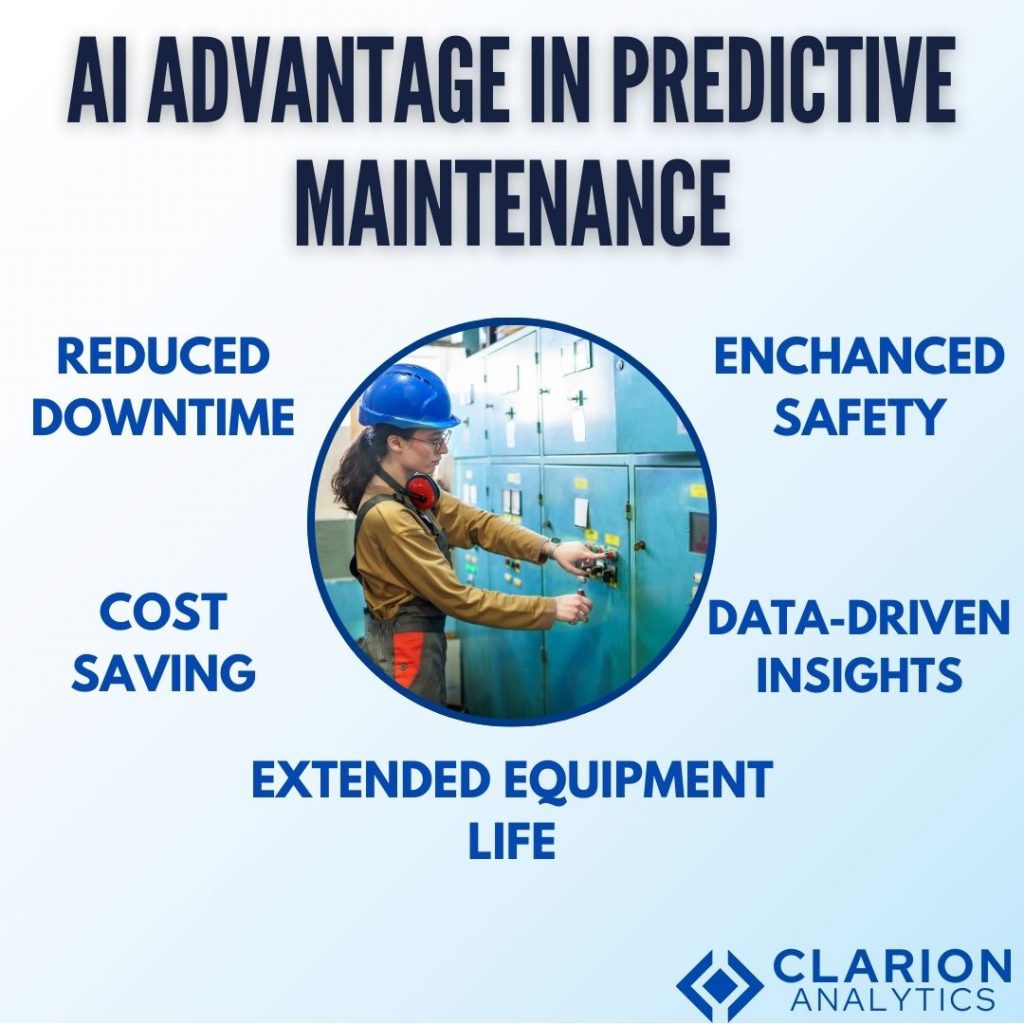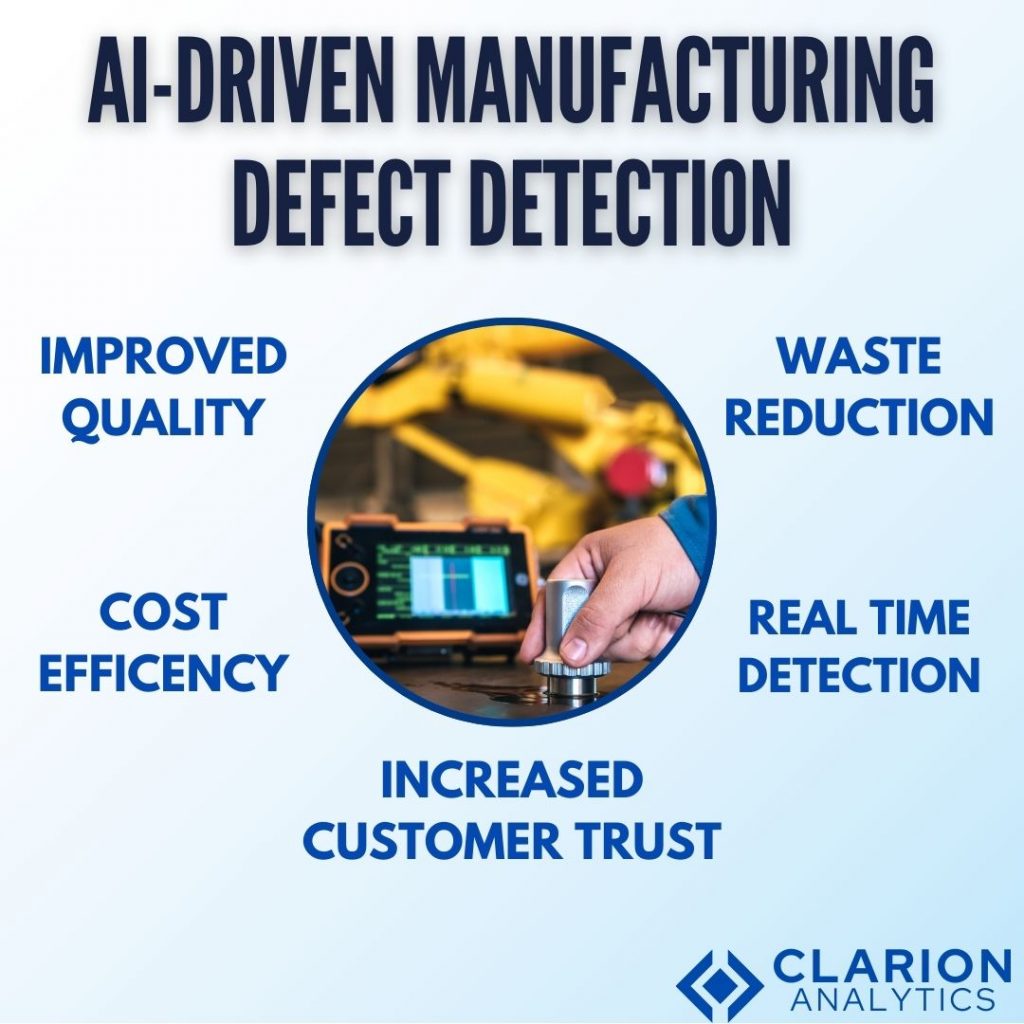![3[1] defect detection in manufacturing by AI](https://clarion.ai/wp-content/uploads/2024/07/31-e1721624965750.jpg)
The application of AI in manufacturing experiences a radical reform. The global world economy depends on manufacturing which creates all the essential items needed to function daily. The existing industrial production approaches encounter multiple difficulties because they fail to control defective equipment and maintain effective inventory management and ensure proper quality standards. A rising number of production companies use AI as their primary solution to overcome industry challenges because it lets them boost production while reducing costs and enhancing product standards.
Through analysis this blog demonstrates how artificial intelligence AI can reshape manufacturing operations by focusing on three essential applications which include defect detection along with demand forecasting and predictive maintenance practices. Leaders in IT management use fundamental research findings combined with market estimation and essential advantages of these applications to make strategic decisions regarding AI application in manufacturing operations.
Market Sizing:
The AI in manufacturing market is rapidly growing due to two main factors: the need for automation and Industry 4.0 technological adoption together with the requirement for data-driven decision-making processes. Market analysts at MarketsandMarkets predict that the AI in manufacturing market will expand through a 57.2% compound annual growth rate (CAGR) raising it from USD 1.1 billion in 2020 to USD 16.7 billion by 2026.
The market blossomed rapidly because of the following multiple contributing elements: The market expansion results from technological advancements in machine learning and artificial intelligence and the Internet of Things which facilitate enhanced manufacturing operations. Manufacturers adopt AI as a strategy to survive against fast-changing competition in their markets. Operational performance improves because AI capabilities enhance both productivity levels and reduce maintenance costs. The combination of data analytics with machine learning permits organizations to make tactical choices based on effective insights. Controlling
Predictive Maintenance
Research Insights
Predictive maintenance stands as the most promising industry application of AI in manufacturing. The combination of AI algorithms enables manufacturers to identify equipment failures before they materialize thus enabling continuous production operation and minimizing maintenance expenses. According to McKinsey predictive maintenance enables factories to minimize downtime but also prolong the lifespan of their equipment by 20-40%.
Demand Forecasting
Research Insights
The precise forecasts of future product requirements which AI-driven demand forecasting provides helps manufacturersalance their inventory levels and deliver better customer satisfaction. Golden demand forecasting enables companies to manage supply versus demand equilibrium to decrease the costs of inventory-storage and strengthen their complete supply network operations. AI technologies in manufacturing increase forecasting precision by 50% which leads to extensive improvements in supply chain performance according to Deloitte’s research.
Key Points Machine learning algorithms determine high-precision demand predictions through their analysis of historical business data combined with market trend observations. AI systems enable businesses to sustain efficient inventory levels which stops both inventory surplus and supply shortage problems. Better Customer Satisfaction Occurs When Products Can Be Accessible at the Moment Customers Need Them Thus Resulting in Improved Customer Loyalty. The elimination of unwanted inventory lowers both holding expenses and enhances economic performance. Enhanced Supply Chain Functioning happens when accurate demand predictions enable efficient production planning and resource allocation.
Manufacturing Defects
Research Insights
AI-powered systems that combine computer vision with machine learning capabilities detect manufacturing defects as they happen in real time. Through this technology manufacturers achieve their quality standards alongside minimized production costs and decreased waste formation. The Boston Consulting Group provides evidence which demonstrates AI in manufacturing can detect defects at a rate exceeding 90% thereby attaining superior quality products with less need for recalls.
Key Points During manufacturing AI systems detect defects right when they appear which lets operators execute rapid solutions for correction. Brand reputation enjoys improvements through the assurance of uniform quality standards in all products. Waste Reduction through QA systems occur because they find and solve production defects shortly after their appearance. Business expenses diminish because the system minimizes the occurrence of defective products together with product recalls and reworking requirements. Since customers receive reliable products which uphold their expectations the company builds lasting trust relationships with them.
Conclusion
AI is revolutionizing the manufacturing industry by enhancing efficiency, reducing costs, and improving product quality. The market for AI in manufacturing is set to grow exponentially, driven by advancements in predictive maintenance, demand forecasting, and defect detection. CIOs who leverage these technologies will be at the forefront of this transformation, driving their organizations towards greater success and innovation .
Intrigued by the possibilities of AI? Let’s chat! We’d love to answer your questions and show you how AI can transform your industry. Contact Us
Also read about – How LLMs have changes UI and UX in software engineering
Also read about – 10 Tips To Train Deep Learning Model Using Yolo
Also read about – openvino



